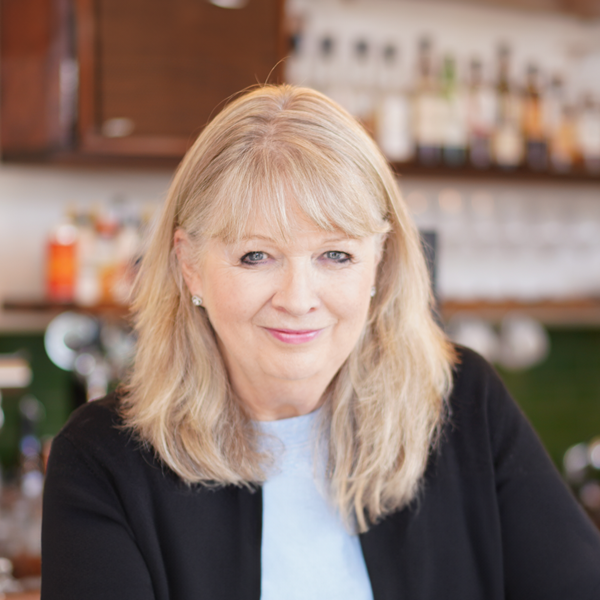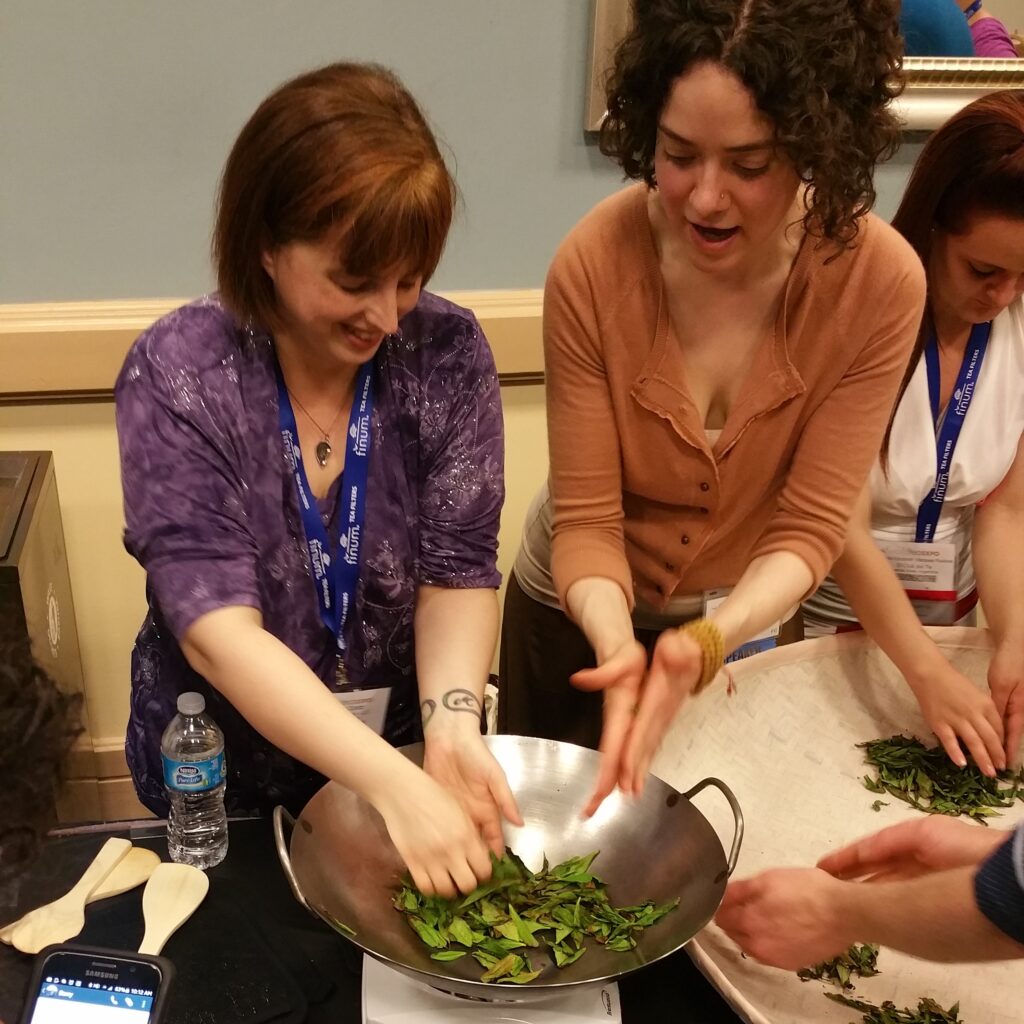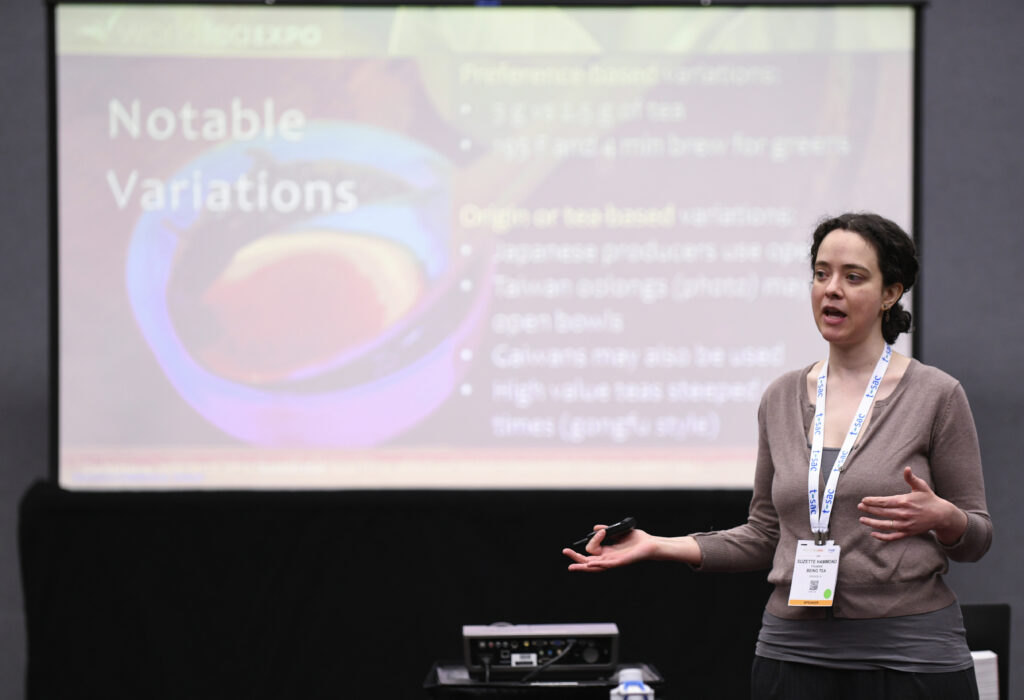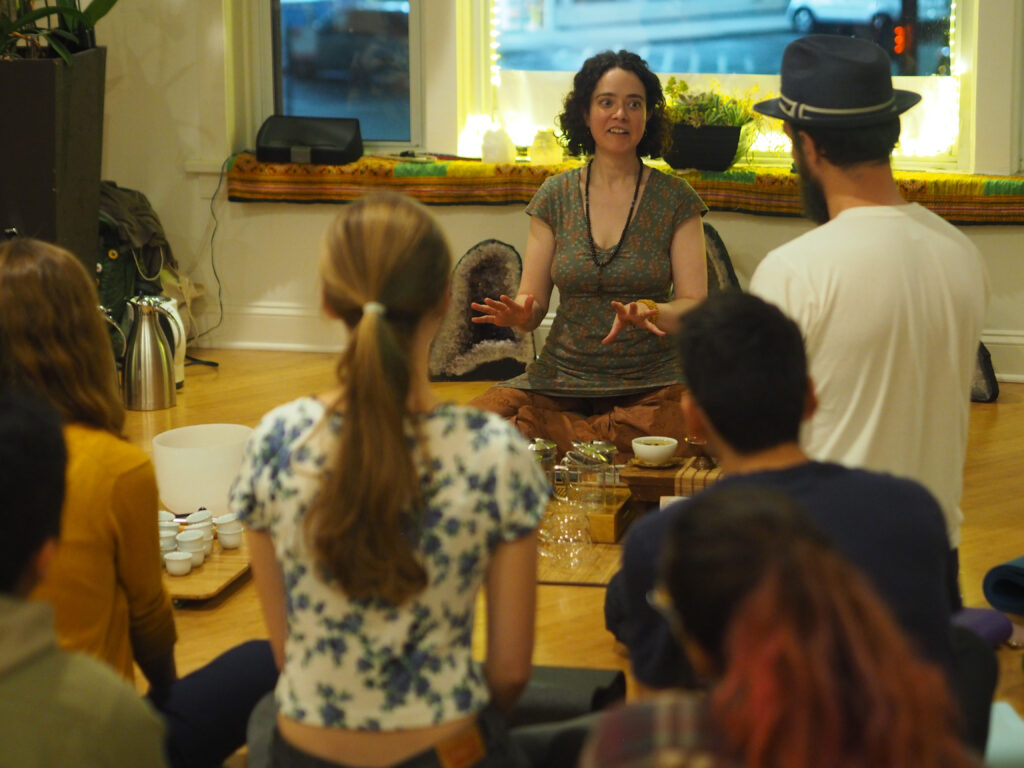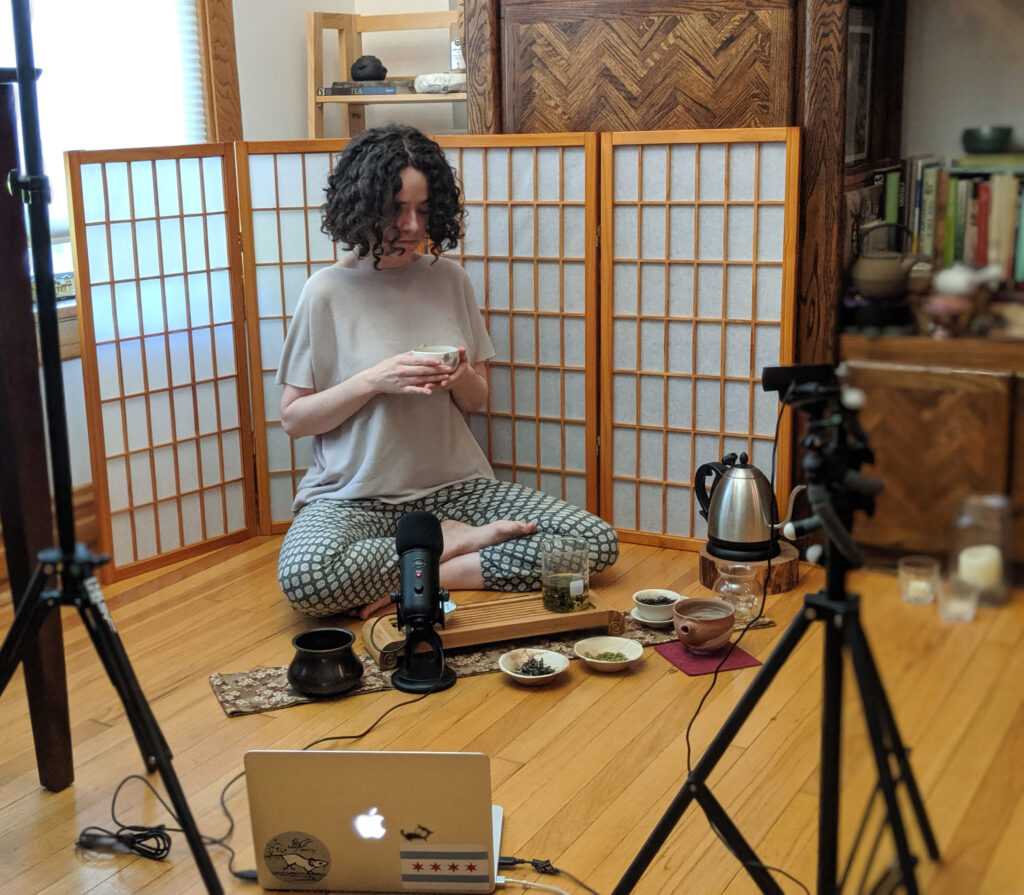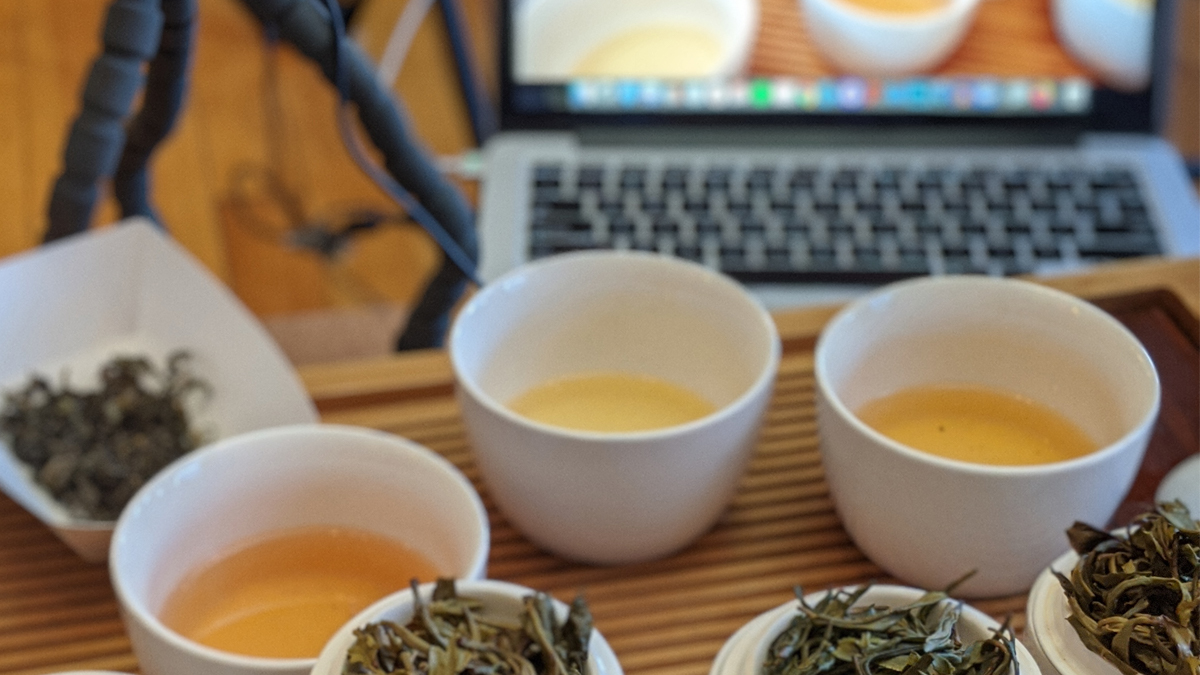World Tea Academy is making a fresh start in the new year, unveiling a new website and a refreshed portfolio of online and on-demand classes at lower fees. The curriculum spans the interests of tea enthusiasts and offers five certifications for those employed in tea. Australian Tea Masters Founder Sharyn Johnston designed the new curriculum and developed the website. She is with us today to talk about joining forces with Questex, owners of the World Tea brand. “This partnership marks a landmark moment for us, offering an extraordinary opportunity to showcase our deep commitment to tea education on a global stage,” she said.
- Certifications include Tea Specialist, Tea Professional, Tea Sommelier, Tea Health Expert, Tea Blender, and Tea Aroma Expert.
Listen to the interview
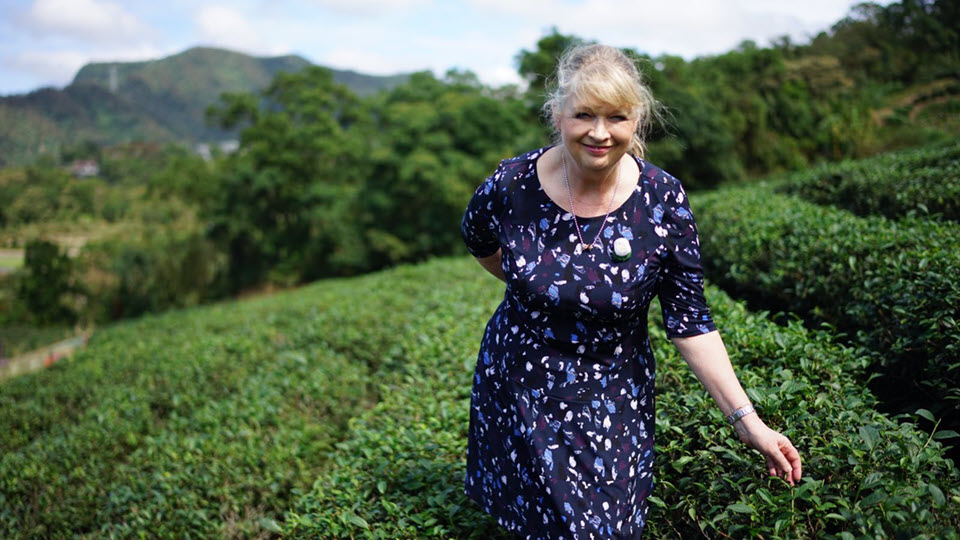
Low-Cost Foundation Course is Key to Training Baristas
By Dan Bolton
Sharyn Johnston is the newly named head of education at World Tea Academy. She was the founder in 2011 and remains CEO of Australian Tea Masters, a global resource for tea training, tea blending, tea consultancy, and tea education in Australasia. Sharyn has authored two handbooks on tea, one defining the role of the sommelier and the other explaining the basics of tea blending. She is a skilled taster who buys, sells, and blends millions of kilos of tea annually as the head of Australian Tea Masters Wholesale and Blending—the company’s trading arm. With offices in Singapore, Sri Lanka, and Indonesia, it was launched in 2017.
Sharyn is a member of the advisory board and Head Judge of “Tea Masters Cup International.” Sharyn has traveled to more than 20 countries, where she often speaks at conferences and festivals attended by tea enthusiasts and professionals. Tea Masters offers a portfolio of approximately 30 tea courses across all sectors with a strong focus on specialty teas. Australian Tea Masters has organized and will operate the newly updated education platform the World Tea Academy uses.
“This partnership marks a landmark moment for us, offering an extraordinary opportunity to showcase our deep commitment to tea education on a global stage.”
– Sharyn Johnston
Dan Bolton: What do you enjoy most about teaching people about tea?
Sharyn Johnston: Number one is the people I meet worldwide when we run a class; they’re all so different. They’ve all got different likes and dislikes in tea and different backgrounds. It’s just a great opportunity to travel, meet people, and learn more about tea every day; I always learn something new myself.
I’ve gone to origin in so many different countries, I’ve trekked around the tea farms, I’ve met the small farmers, I have put a huge amount of energy in the last seven to eight years with at least half a year each year I have spent traveling to tea farms and meeting the people at the ground level. I wanted to experience making tea with them and understanding the processes. I want to be able to share that through education. That will probably be my big focus, showing the real world of tea, not the commercial world, but showing the real world of tea through education.
Dan: Tim McLucas, VP and Market Leader of the Bar & Restaurant Group at Questex, writes that Australian Tea Masters is “uniquely positioned to support the growing demand for online tea education, plus provide new opportunities for professionals to meet and learn in person and connect face to face with the tea community including producers, retailers, suppliers, and other key industry stakeholders.”
I hold World Tea in high regard, and as the first editor and publisher of World Tea News, I have followed their competitions and education programs since they were created.
It sounds to me like you are well-paired in this new venture.
Sharyn: Oh, thank you. I’m honored to have been asked to collaborate with The World Tea Academy. Twelve or 13 years ago, when I started in tea, I went to the World Tea Expo to try and learn more about tea. I was so impressed with the classes; having people together all love tea was such a great experience.
I’ve attended almost every World Tea Expo since then, and I’ve always loved it, so I can’t believe I have this opportunity to work with and collaborate with World Tea Academy. I see great opportunities in the education side of tea.
Dan: How will you differentiate your program from others? I’d like you to share your vision of how the academy might evolve with readers.
Sharyn: We’ve built a new website that is very modern, enhanced all the content, and added more than 1,000 new photos, images of tea plantations, and things like that. We’ve got a long way to go.
We’ve got some amazing ideas for the future, and we want to build on that. One of the things we’ve already introduced is a new Basic Foundation course in tea.
That was one of the important things missing from the academy curriculum. We developed the world’s first tea 101 course online about nine years ago before it was the thing to do. And we’ve just had so many positive comments from that course over the years.
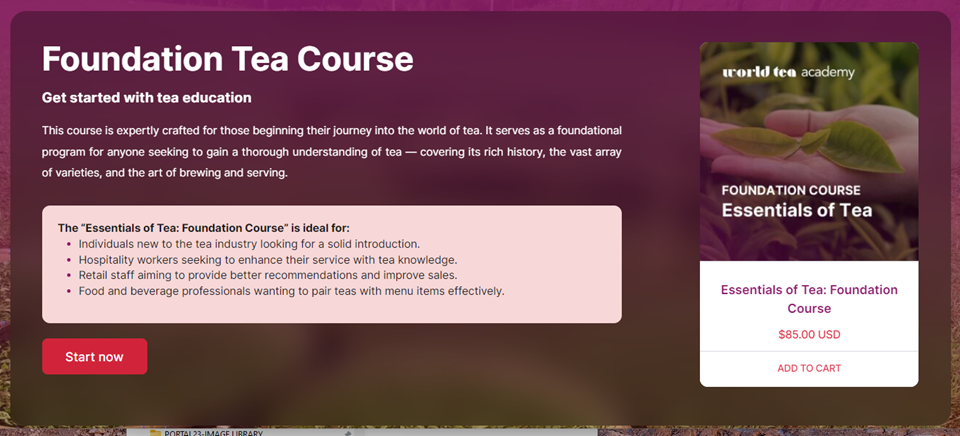
Dan: The Foundation Course is only $85. It is a self-paced course in eight lessons that covers a broad range of topics from tea types and origins to cultivation and processing, brewing techniques, and tasting tips, as well as ceremonies and culture, serving etiquette, health benefits, and even food pairing.
Why is basic education in tea needed more now?
Sharyn: If you look at coffee, the specialty coffee industry has gone from instant to granulated freeze-dried coffee to professional baristas.
When people walk into a cafe and want to know about a coffee product, where it comes from, how it is processed, and how to prepare it, all that information is available.
We’re still so far behind in tea. Go into a café and the only thing you usually get offered is English breakfast, Earl Grey, Peppermint, or Chamomile. And that’s why education is critical to the tea industry moving forward.
We want to change that. We want World Tea Academy to be the best education platform in the world and to have a lot of exciting content so that we inspire younger people. I think that’s the key to moving forward. So that’s one of the things we want to focus on: how can we make tea a bit trendier and easier to understand? We want to share the amount of different teas out there and how fascinating tea can be.
We’ve got some really good ideas, especially on the specialty side, that we’ll release in the next month or so. That’s one of my key focus areas.
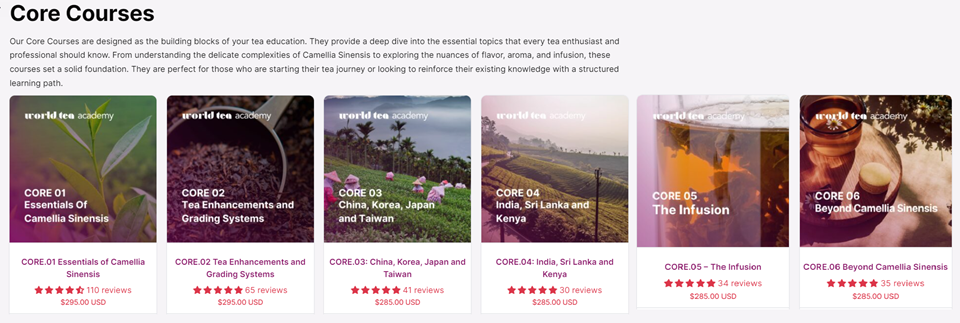
Dan: Retailers rely on well-trained staff. Kevin Gascoyne, a partner at Camellia Sinensis in Montreal, told me that the amount of information most clients need is quite small. But he said, “All this in-depth information helps to drive the company culture and inspire the staff to sell it. It keeps their geekiness and enthusiasm for the product alive. It also drives that percentage of the tea-drinking population that is really thirsty to know more and more because it’s become an intellectual, learning, and collecting hobby, not just a gourmet hobby of consuming.”
Sharyn: We are so grateful to the coffee industry because the baristas are already there. They already understand what it takes to educate people in specialty coffee. If we can educate the baristas, many are already doing pour-overs, and they are using AeroPress. They’re using all the modern tools for serving coffee to brew tea. We’ve been doing this now for, you know, for four or five years in Australian Tea Masters. We’ve been educating our students in using the alternative brewing methods that they use for coffee with tea. So, you don’t need to go and get an extra tea person. Often, these businesses can’t afford to hire a tea specialist, so we must try to train the hospitality staff.
We want to show them their options without changing how they do things in the cafe. For example, they can serve tea using coffee equipment. When I did one of the classes last year in Singapore, we put tea in the group heads on the espresso machine and ran some trials, and it was quite an amazing experience. So, there are lots of things that just haven’t been done. And I think once you show the baristas or the staff in a cafe, they’ll be excited when they realize what can happen with tea.
It becomes easy to serve tea with just a bit of knowledge. This is where the Foundation Courses are very important because the Foundation Course will give a barista some good basic knowledge about tea, and that’s why we’ve chosen that to be one of the priorities. It is also a great tool for beginners in tea and the public.
So yes, I think the people are already there — they just need to be educated. We don’t need to go and look for people; we need to utilize the people already there within the hospitality sector. Of course, don’t forget the bar staff. The idea of integrating Bar and Hospitality with the World Tea Expo is a great opportunity to cross over into education.
Dan: I experienced that in Australia, where shop owners present themselves as specialty beverage retailers instead of dedicated tea or coffee shops. There was always an expresso machine and a selection of high-quality tea. Retailers assume their customers prefer premium beverages of all types.
Sharyn: The American market is very different. I’ve educated tea enthusiasts and professionals in many countries, and consumer preferences in each country are very different. Take Singapore; we have offices there, and flavor profiles for clients are very different than flavoring levels in the US. Australia, in contrast, prefers minimal flavor levels. You also have as much as 30 to 40% higher flavor levels in the US and Canada. There’s a big gap compared to the specialty tea market, where you’re trying to have pure teas. Flavored teas are a great stepping stone to more sophisticated teas. I think there’s a massive opportunity for the specialty tea market now.
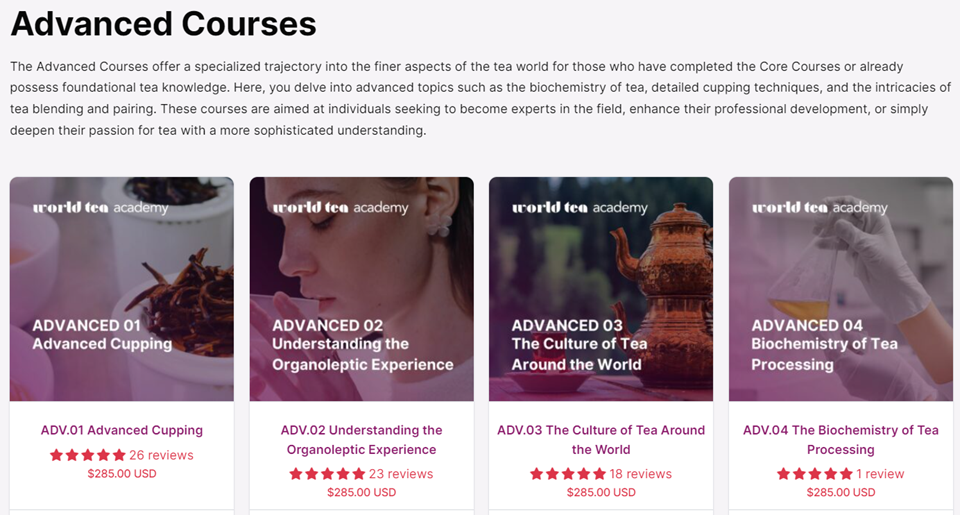
Dan: You’ve designed it to be broad-based. Who benefits from this training?
Sharyn: I think the hospitality sector, you know, number one.
The basic course is for the general public and the hospitality sector, so they will start asking questions like: Why can’t we have good quality tea?
So, education in general. Just educate them to realize that tea is quite an easy beverage to serve, and hopefully, with a bit of knowledge, there’s some new excitement happening. Also, educate them about the varieties; I mean, we literally have thousands of different tea types available, so we have so many opportunities to excite people.
Dan: In announcing the refresh, Questex said there will be new opportunities to conduct face-to-face training. I owe a lot to STI volunteers like Suzette Hammond, who invested thousands of hours in face-to-face instruction. Norwood Pratt once told me that to really understand tea, “each one, tea one.”
Sharyn: I’ve been teaching mostly face-to-face for the last ten years. We did develop the online course about eight years ago, but, you know, all our courses are about tea mastery in the modern sense of tea mastery. You know, this is one of the reasons I got involved in education. I tried to learn about tea. It was just so difficult to learn about the global perspective of tea in one location, and that is where we really want World Tea Academy to be the best education platform in the world.
You could go to China and learn about their teas, and you could go to Sir Lanka to learn about their teas, but pulling it all together was very difficult.
So, I think that has been helpful. And we will continue with those face-to-face classes. We still hold those classes in Singapore, Sri Lanka, Indonesia, and Australia. But you know, the thing is, people are busy these days. So online is very helpful. We want to make the courses much more self-paced so they can really sit and relax and enjoy their education online.
They both have their place. They’re both very important. And, well, the World Tea Expo is still a great venue for people to come in and have a great experience, cram knowledge for two to three days, and learn a lot about tea.
I will be there. This year is exciting, of course. And it’ll be exciting to see the new speakers that they’ve got because they always manage to pull a good lineup of speakers. Anyone interested in tea will find it a great place to go.
Photos are courtesy of Australian Tea Masters — all screenshots are from the World Tea Academy website.
Latest Episodes
Powered by RedCircle
Share this post
Episode 150 | Australian Tea Masters CEO Sharyn Johnston, the new Head of Education at World Tea Academy, says her company built a modern online education platform with enhanced content for the Academy to train waitstaff and advance the quality of specialty tea in food service. “One of the things we’ve already introduced is a new Basic Foundation course in tea. We’ve got some fantastic ideas for the future, and we want to build on that,” she said.

